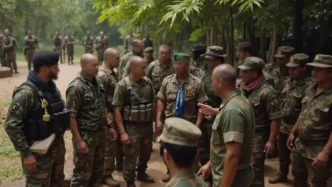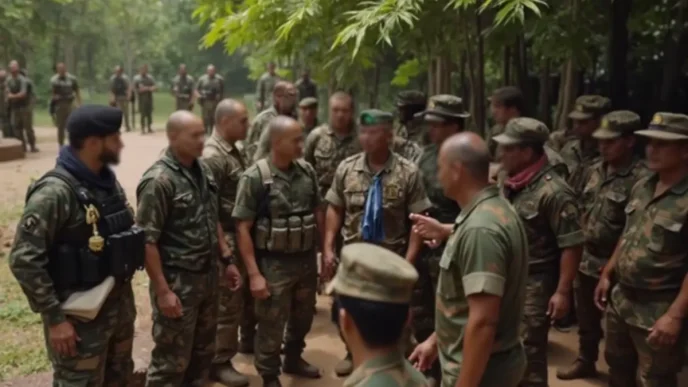A Gulfstream G550 jet, believed to be carrying former Philippine President Rodrigo Duterte, touched down at Rotterdam The Hague Airport on 12 March 2025, marking a historic chapter in the pursuit of international justice. Duterte, arrested on an International Criminal Court (ICC) warrant tied to his administration’s brutal war on drugs, has become the focal point of global attention, with his flight tracked by over 10,000 users worldwide on platforms like FlightRadar24.com. This arrest signals a potential turning point in holding high-profile leaders accountable for alleged crimes against humanity, though it also raises complex questions about sovereignty, international law, and the Philippines’ fraught relationship with the ICC.
A Dramatic Journey to The Hague
The journey of the former president, whose populist tenure from 2016 to 2022 was defined by a hardline anti-drug campaign, began with his arrest in Hong Kong on Tuesday morning, 10 March 2025, at the request of Interpol. From there, Duterte was reportedly transferred to a chartered Gulfstream G550 jet, tail number RPC2519, departing Villamor Air Base in Pasay City around 11 p.m. local time. The aircraft made a brief layover in Dubai before continuing to the Netherlands, where it landed at Rotterdam The Hague Airport in the early hours of 12 March. According to flight tracking data, the plane’s movements captivated a global audience, becoming the most monitored flight on FlightRadar24.com with 10,001 trackers by 5:15 p.m. Philippine Standard Time on Wednesday.
Efforts to confirm specific details of Duterte’s travel itinerary with his camp proved inconclusive. Atty. Salvador Panelo, Duterte’s former chief legal counsel, told local media he had no information on the flight’s departure from Dubai’s Al Maktoum International Airport or its estimated arrival time in the Netherlands. Nonetheless, the arrest and subsequent transfer have underscored the gravity of the charges Duterte faces at the ICC, headquartered in The Hague, where he is expected to answer allegations of orchestrating a deadly crackdown that claimed thousands of lives.
The ICC Warrant: A Long Road to Accountability
The ICC’s arrest warrant against Duterte stems from an investigation into his administration’s war on drugs, a policy that saw an estimated 6,000 to 30,000 deaths, many in extrajudicial killings, according to human rights groups. Launched in 2016 as a cornerstone of Duterte’s presidency, the campaign targeted suspected drug users and dealers with ruthless efficiency, often bypassing due process. Police and vigilante groups were accused of carrying out summary executions, with families and activists alleging widespread impunity for the perpetrators.
The ICC formally opened its probe in 2021, despite the Philippines’ withdrawal from the court in 2019 under Duterte’s orders—a move widely seen as an attempt to shield his government from scrutiny. The court, however, retained jurisdiction over alleged crimes committed while the country was still a member. The charges against Duterte include crimes against humanity, specifically murder as part of a widespread and systematic attack on civilians. If confirmed, this case could set a precedent for prosecuting sitting or former heads of state, reinforcing the ICC’s mandate to address impunity on a global scale.
Yet, the arrest is not without controversy. Duterte and his allies have long argued that the ICC lacks jurisdiction over the Philippines, framing the investigation as an infringement on national sovereignty. Supporters in Manila have echoed this sentiment, with some labelling the arrest as a form of “Western overreach” into domestic affairs. On the other hand, victims’ families and human rights advocates have hailed the development as a rare moment of justice for those killed during the drug war, many of whom were from impoverished communities.
Implications for the Philippines and Beyond
Duterte’s arrest reverberates far beyond the personal fate of the former leader. In the Philippines, it has reignited debates over the legacy of his presidency, which remains polarising. To his supporters, Duterte was a strongman who brought order to a country plagued by crime and corruption, with his unapologetic style resonating with millions. To critics, his tenure was a dark chapter marked by authoritarianism and human rights abuses, the scars of which continue to haunt Filipino society.
Politically, the arrest could strain relations between the current Philippine government and the ICC. While President Ferdinand Marcos Jr., who succeeded Duterte in 2022, has taken a less confrontational stance toward international bodies, his administration has yet to fully clarify its position on rejoining the ICC. Analysts suggest that cooperating with the court may be seen as a betrayal by Duterte’s loyal base, including influential figures in politics and law enforcement. Conversely, ignoring the ICC’s actions risks isolating Manila on the global stage, potentially impacting foreign aid and diplomatic ties.
On a broader scale, Duterte’s case tests the ICC’s effectiveness in holding powerful leaders to account. The court has faced criticism for its perceived focus on African nations while struggling to prosecute figures from more geopolitically significant states. A successful trial—if it proceeds—could bolster the ICC’s credibility, demonstrating that no individual is above international law. However, if political pressures or legal challenges derail the case, it may further undermine confidence in the institution’s ability to deliver justice.
Public Sentiment and Global Reactions
Public reaction in the Philippines has been predictably divided. In Manila, small protests both for and against Duterte emerged following news of his arrest, with some calling for his release and others demanding accountability. Social media platforms, including X, have amplified these voices, with hashtags related to Duterte trending globally. Posts from Filipino users range from expressions of outrage over “foreign interference” to messages of relief that “justice is finally being served.”
Internationally, human rights organisations such as Amnesty International and Human Rights Watch have welcomed the arrest, urging the ICC to ensure a fair and transparent process. Western governments, including the United States and European Union member states, have issued cautious statements, emphasising the importance of due process while refraining from explicit endorsements of the ICC’s actions. This measured response likely reflects the delicate balance of maintaining diplomatic relations with the Philippines, a key ally in the Indo-Pacific region amid rising tensions with China.
Uncertain Future and a Moment of Reckoning
As Duterte arrives in The Hague, the legal road ahead remains uncertain. Initial proceedings at the ICC will determine whether he is formally charged and whether he will be detained during the pre-trial phase. Legal experts note that the process could take years, with potential challenges from Duterte’s defence team over jurisdiction and the admissibility of evidence. There is also the possibility of political intervention, either from the Philippine government or through backchannels, to negotiate a resolution outside the courtroom.
For now, the world watches as one of the most controversial leaders of the 21st century faces the prospect of international justice. If the allegations against Duterte are substantiated, the case could serve as a powerful deterrent to leaders contemplating similar policies of violence and impunity. Yet, if the process falters, it may embolden those who view international law as a toothless mechanism, easily sidestepped by political will.
Rodrigo Duterte’s arrest at the behest of the ICC is more than a legal proceeding; it is a moment of reckoning for the Philippines and the global community. It forces a confrontation with uncomfortable questions about the balance between state sovereignty and universal human rights, the limits of power, and the mechanisms by which justice is pursued across borders. For the families of those killed in the drug war, it offers a glimmer of hope that their losses may not be forgotten. For Duterte himself, it represents an unprecedented fall from the heights of political power to the scrutiny of an international tribunal.
As proceedings unfold in The Hague, the eyes of the world remain fixed on this case—not just for what it means for one man, but for what it signals about the future of accountability in an often unaccountable world. Whether this marks the beginning of a new era for international justice or a reminder of its limitations remains to be seen. One thing is certain: the story of Rodrigo Duterte is far from over.














